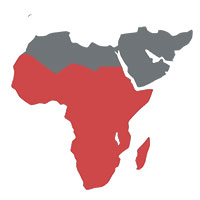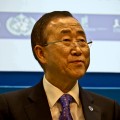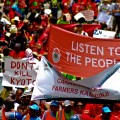Day 1: “It always seems impossible…”
Tim Hall | November 29, 2011.
COP17 climate negotiations began with a flurry of urges and recommendations, though moves to kill Kyoto soured the first day.
Quoting Nelson Mandela to invoke South Africa’s difficulty in defeating apartheid, Christiana Figueres, executive secretary of UN Framework Convention on Climate Change (UNFCCC), reminded delegates that, “it always seems impossible, until it is done.”
The urgency of the moment was driven home with news that massive storms in the host city had flooded shack settlements, killing at least six and damaging countless homes. Most ominously the fierce storms also damaged the roof under which negotiators sat.
Yet inside the conference the mood was soured by credible reports from CTV that Canada was planning to formally withdraw from the Kyoto Protocol. While civil society admitted it didn’t come as a surprise, considering Canada’s poor record on combating climate change and their expanding tar sand oil production policies, the news represented a further move towards a death of the Kyoto protocol.
The news on the opening morning of the COP however set a negative tone, with civil society highlighting the bad faith Canada now brings into negotiations. For it’s efforts, Canada picked up first and second prize for fossil of the day.
The opening plenary was also tinged with sadness as delegates commemorated Mama Konate, former chair of the Subsidiary Body for Scientific and Technological Advice, whose unexpectedly passed away on November 14th.
“Let Durban be the place where parties will be able to work together. We owe this to the memory of our brother, Mama Konate,” said COP17 President Maite Nkoana-Mashabane.
Before handing over to Nkoana-Mashabane, last year’s COP16 President Patricia Espinosa called on delegates to take initiative and not wait for others.
Espinosa outlined three goals for COP17, which involved the implementation of the Cancun Agreement, establishment of the Green Climate Fund (GCF) and creating a rules based system to complement agreements between countries.
South African President Jacob Zuma, after arriving late to the session, urged delegates to fight for consensus, a point emphasised throughout the day.
The future of the Kyoto Protocol was raised by a number of countries, with the EU insisting on negotiations for a global agreement to begin by 2015, and to be implemented by 2020. Some countries, like Australia, want a clear direction that a legally binding treaty will be adopted in 2015. Russia, Japan and Canada however have made clear they do not want a second commitment period to Kyoto. While the world’s largest greenhouse gas emitter China described Kyoto as “a cornerstone of an international climate regime,” they are unlikely to agree to anything without the support of the United States.
Christiana Figueres said the “vulnerable” need to be assured that tangible action is being taken for a safer future.
It was a point reiterated by delegates from African nations. The representatives of the South African Development Community, Angola’s Vice President dos Santos and the representative of the Economic Community of Central African States, president of Chad, Idriss Déby, reaffirmed the impact climate change is having on developing nations, and emphasised the role of the developed countries in combating global warming.
President Déby described how Lake Chad, a body of water upon which 20 million people rely, has shrunk to 10 per cent of its capacity.
“Solidarity must be expressed between polluting developed and poor countries who are the victims of pollution,” Déby said.
The Alliance of Small Island States (AOSIS) also continued their push for a maximum 1.5°C warming, highlighting their vulnerability to climate change and pushing for urgent action at COP17.
“If Durban puts off a legally binding agreement and closes the door on raising mitigation ambition before 2020 many of our small island states will be literally and figuratively doomed.”
Non-governmental organisations say such an agreement will depend on delegates resisting delays overcoming existing hurdles—a sentiment unlikely to be helped by Canada’s defiance on Kyoto. But as President Zuma reminded delagtes, “With sound leadership nothing is impossible here in Durban.”
By Julian Koschorke, photo by Willemien Calitz.













comment